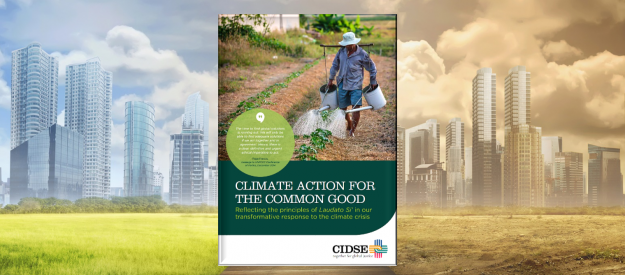"We are losing our attitude of wonder, of contemplation, of listening to creation and thus we no longer manage to interpret within it what Benedict XVI calls 'the rhythm of the love-story between God and man.'"
+ Pope Francis
Catholic groups challenge governments on climate change

A new paper, Climate Action for the Common Good, was launched today at the United Nations climate talks in Bonn by CIDSE — "Coopération Internationale pour le Développement et la Solidarité"—an organization of eighteen Catholic social justice organizations from around the world.
In releasing the document, CIDSE said it wanted to encourage governments to respond to climate change in a way that reflects the spirit of Pope Francis’s landmark encyclical Laudato Si’, which many credit for having a significant impact on the passing of the 2015 global climate deal in Paris.
Like others watching the international talks, CIDSE noted that two years after that agreement, countries have done little to fulfill their climate commitments, while the United States has even left the agreement.
"While the Paris Agreement saw countries agree to limit global temperature increases to no more than 1.5 – 2 degrees above pre-industrial levels," CIDSE said in today's announcement, "forecasts suggest that current pledges to limit carbon emissions based on our current economic and development models will fall far short of meeting this target."
Speaking at COP23, Father Bruno Marie Duffé, secretary of the Vatican Dicastery for Promoting Integral Human Development, who is representing the Holy See at the talks, said: “We should not underestimate the importance of the moment we are in now. We are in the middle of the river, and we cannot go back. We have to be together, and we have to be strong, even if one state decides to go back. We have had the Paris agreement and now we have to move from the ethical intentions to making the political happen, and to do that we will need a new model of development that is rooted in dialogue and mutual solidarity, and that recognizes the talents that each party has to contribute.”
Josianne Gauthier, Secretary General at CIDSE said: “Through the paper we want to reinforce the urgency of the Pope’s call for transformation in Laudato Si’. Options exist, human ingenuity and creativity exist and local and indigenous knowledge. It is time that people and their solutions become the center of urgent and ambitious climate action.”
Climate Action for the Common Good says that governments should ask searching questions about their plans to tackle climate change. It suggests that countries consider how climate action can address poverty and human rights, whether the ambition shown matches the scale of the challenge, if their national climate plans encourage the participation of all people, and how the world can transition to a zero-carbon world in a way that does not negatively impact on the poorest and marginalized in society.
See the report Climate action for the Common Good online here


















